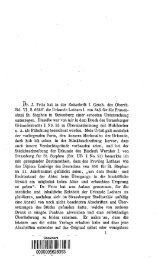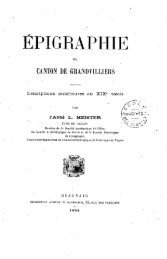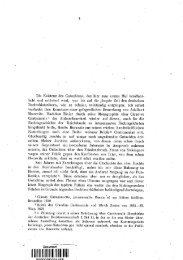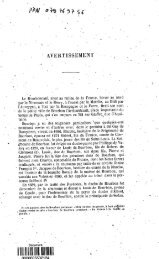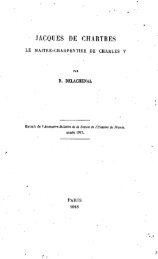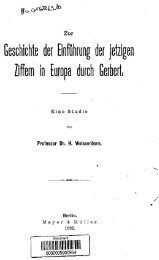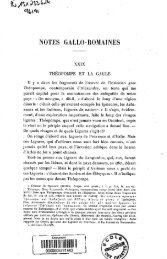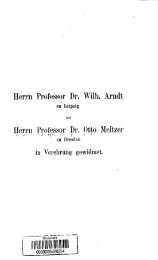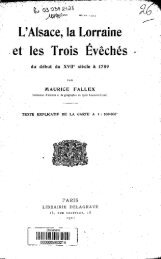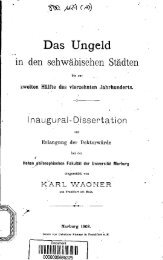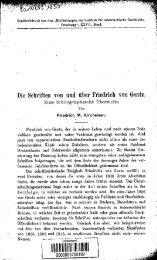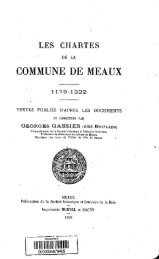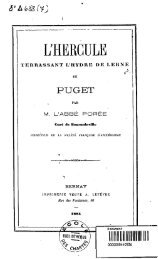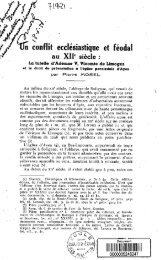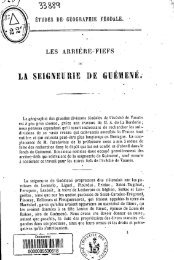4P Li gç(' TRANSACTIONS
4P Li gç(' TRANSACTIONS
4P Li gç(' TRANSACTIONS
You also want an ePaper? Increase the reach of your titles
YUMPU automatically turns print PDFs into web optimized ePapers that Google loves.
VOL. 47, PT. 5, is] ORESME'S VERSION AND ENGLISH TRANSLATION 815<br />
T. Et afin que l'en quere et prepare les choses qui<br />
sunt dehors le hostel, cc est le niari; et que l'autre salve<br />
et garde ceiles qui sunt dedens. Et convient que l'un,<br />
ce est le man, soit puissant, fort et robuste a operation;<br />
et l'autre est fieble as negoces dehors. Et le homme est<br />
piere ou moms dispose a repos et melleur ou miex<br />
dispose a mouvemens ou a plus fors labours.<br />
G. Et donques le homme est plus chaut, plus fort et plus<br />
actif et Ia femme plus froide, plus fieble et plus passive.<br />
Et ceste contrarieté ou varieté les ont enclinés a diverses<br />
operations, lesquelles leur sunt pro fictables et convenables<br />
pour converser ensemble. Ft pour cc, quant ceste contrarieté<br />
// (333a) ou dissimilitude est naturelment et selon<br />
incurs bien proporcionee, elie est douce et delectable. Et<br />
scion cc disoit le Sage que homnie et femme qui sunt consentans<br />
on en concorde ensemble, cc est une chose pleiseinte<br />
a son esperit, approvee et bee de Dieu et des hommes. Et<br />
me semble que cc est aussi comme en musique: Ia dissimilitude<br />
et inequalité des Sons fait bon acort et bonne consonance,<br />
car elle est deuement proporcionee. Et par aventure,<br />
en signifiance de cc ordena nature que vois de homme<br />
ou resgart de vois de femme est communehnent en Ia proporcion<br />
qui fait la nielleur consonance, cc est double; et<br />
est appellee dyapason en musique. Item, a cest propos<br />
Ovide ou livre de Art de amer met comment la vigne est<br />
freile et fieble et ne se peut par soy soustenir ne faire fruit:<br />
mes quant elle est conjointe a l'arbre elle est soustenue et<br />
porte fruit. Et semblablement dit it de la femme on resgart<br />
de le honime. Et donques ceste conjunction est delectable<br />
et profictable et est tres conveniente. Et pour cc<br />
dit l'Escripture: Amicus et sodalis in tempore convenientes<br />
et super utrosque mulier cum viro. Apres it met difference<br />
et convenience entre les parens et les enfans.<br />
T. Et des filz la generation est propre et le utilité est<br />
commune.<br />
G. Car les parens funt la generation des enfans et les<br />
enfans ne engendrent pas leur parens. Et donques la generation<br />
est propre as parens et cc est la difference. IvIes<br />
les parens aident as enfans en lcur jennece et les enfans<br />
aident as parens en leur viellece. Et pour cc dit it que le<br />
utilité est commune et cc est la convenience.<br />
T. Car as uns appartient nourrir et / (333b) as<br />
autres enseignier.<br />
G. Une exposition est qu'il appartient as enfans nourir<br />
]cur parens et as parens enseignier leur enfans en joennece.<br />
Une autre exposition est que it appartient as uns ou as<br />
unes nourrir les enfans, cc est assavoir, as meres, et as<br />
autres enseignier les en bonnes meurs, cc est assavoir, as<br />
peres; jouxte cc que dit l'Escripture: Filii tibi sunt, erudi<br />
illos. Or avons donques comme communication de masle<br />
et de femelle est en espece humaine de ordenance divine,<br />
non pas seulernent pour cause de generation comme es<br />
autres bestes, mes oveques cc pour cause de mutuel aide.<br />
Et est scion cc que Dieu dist au commencement, que cc ne<br />
estoit pas bon que homme fust seul et que it feroit une<br />
chose semblable a lui, qui lui aideroit: Non est bonuni<br />
hominem esse solum; faciarnus ei adjutorium simile sibi.<br />
T. And in order that the husband may prepare and<br />
look after the outdoor work of the homestead while the<br />
wife attends to and watches over the indoor work. And<br />
the husband must be strong, capable and robust for<br />
physical work while the wife is less able to perform<br />
outdoor tasks. And the husband is less given to repose<br />
and is more disposed to action or to the heavier occupations.<br />
G. Thus the husband is more ardent, stronger, and more<br />
active; while the wife is less excitable, weaker, and more<br />
passive. And this opposition or difference of character has<br />
inclined them to different activities which are profitable and<br />
suitable for living together. And when this dissimilarity<br />
// (333a) exists naturally and is well balanced in the<br />
habits of both, it is pleasant and agreeable. And in this<br />
regard, Solomon said that a man and wife who think alike<br />
and live peaceably together are a pleasure to his [Solomon's]<br />
spirit, enjoying the praise and approbation of God<br />
and mankind [Ecclicus 25: 2]. And it seems to me that<br />
this is very similar to the case in music: the dissimilarity<br />
and inequality of the sounds creates a good harmony and<br />
a good combination of tones because they are properly proportioned.<br />
Perchance, it was as a token of this that nature<br />
has ordained that the male voice, with respect to the<br />
female voice, is commonly in that proportion which makes<br />
the best consonance—that is, in the double or octave proportion<br />
and in niusic this is called diapason. And on this<br />
subject Ovid in the Art of Love [Ars amatoria, H. 13]<br />
notes that the vine is frail and weak and cannot support<br />
itself or bear fruit by itself; but when it is joined to the<br />
tree, it is propped up and bears fruit. The same relation,<br />
he says, exists between husband and wife. Thus this union<br />
is pleasant and profitable and is eminently fitting. Wherefore<br />
the Scripture says: "A friend and companion will give<br />
help at the right time; but better than either is the wife<br />
with her husband" [Ecclicus 40: 23]. Next he discusses<br />
the differences and the similarities between parents and<br />
children.<br />
T. The production of children is the proper task of<br />
husband and wife and the benefits are common to both<br />
the parents and the offspring alike.<br />
G. For the parents procreate their offspring and the offspring<br />
do not give birth to the l)Lrents. Thus the propagation<br />
of children is the prerogative of the parents and<br />
this constitutes the difference. But the parents help their<br />
offspring in their youth and the offspring assist their parents<br />
in the latters' old age. And this explains why he<br />
states that the advantage is shared by both the children<br />
and the parents. And this constitutes the similarity.<br />
T. For it is the duty of one parent to nurture<br />
(333b) and of the other to educate.<br />
G. According to one commentator, it is the duty of the<br />
children to nurture their parents and the task of the parents<br />
to educate their children during their youth. Another<br />
commentator explains that the mothers should nurture<br />
the children while the father should inculcate in them<br />
good habits, in accordance with the Biblical injunction:<br />
"If you have sons, correct them" [Ecclicus 7: 25]. So we<br />
may summarize as follows: the life together of the male<br />
and female of the human species is established by divine<br />
ordinance not only for the purpose of procreation, as is<br />
the case with the other animals, but also for the purpose<br />
of mutual assistance. And this accords with Gods statement<br />
at the beginning of the world that it was not meet<br />
that man should exist alone and that He would create a<br />
being like unto him who should help him: 'it is not good



